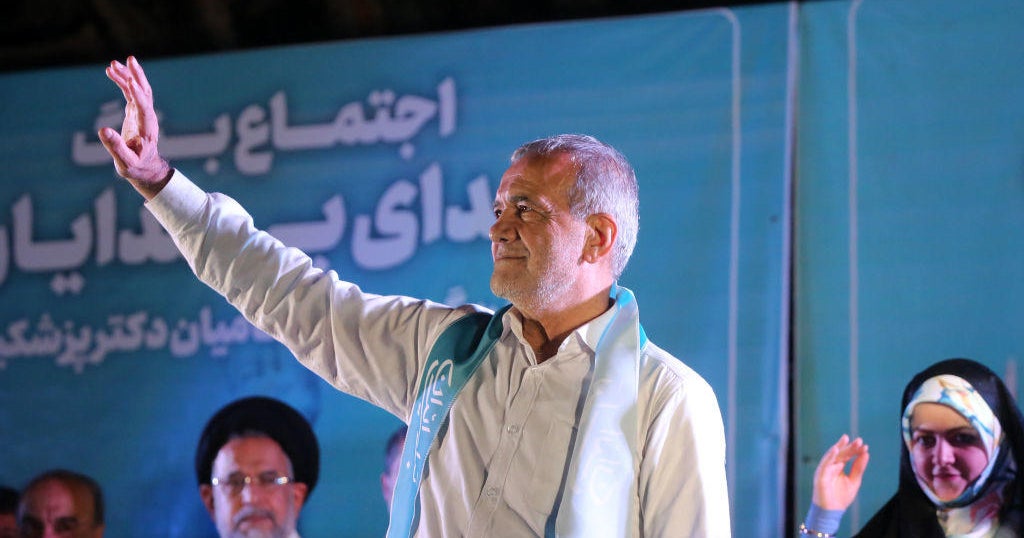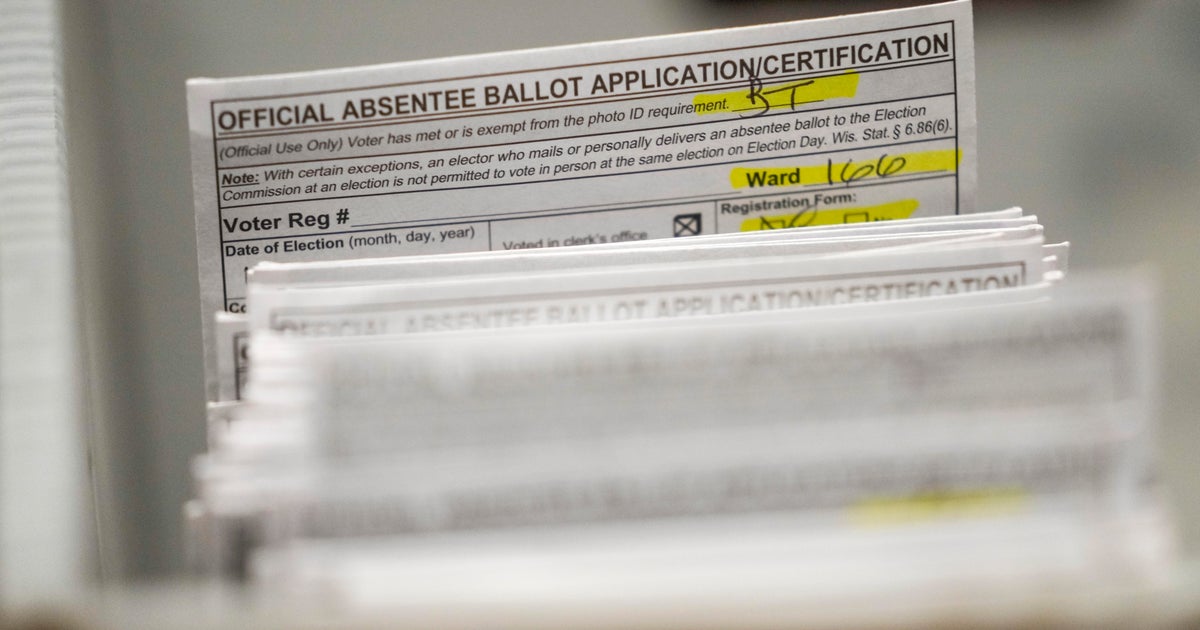CBS News
Ex-U.S. official says Sen. Bob Menendez pressured him to “quit interfering with my constituent”

A former top U.S. agricultural official cast Sen. Bob Menendez as a villain at his bribery trial Friday, saying he tried to stop him from disrupting an unusual sudden monopoly that developed five years ago over the certification of meat exported to Egypt.
A Manhattan federal court jury heard the official, Ted McKinney, recount a brief phone call he received from the Democrat in 2019 soon after New Jersey businessman Wael Hana was granted the sole right to certify that meat exported to Egypt from the United States conformed to Islamic dietary requirements.
Hana, who is on trial with Menendez and one other businessman, is among three New Jersey businessmen who prosecutors say gave Menendez and his wife bribes, including gold bars and tens of thousands of dollars in cash, from 2018 to 2022, in return for actions from Menendez that would enhance their business interests.
Menendez, 70, and his codefendants, along with his wife — who is scheduled for a July trial — have pleaded not guilty to charges lodged against them beginning last fall.
The monopoly that Hana’s company received forced out several other companies that had been certifying beef and liver exported to Egypt, and occurred over a span of several days in May 2019, a rapid transition that seemed “very, very unusual,” McKinney said.
“We immediately swung into action,” the former official said, describing a series of escalating actions that the U.S. took to try to get Egyptian officials to reconsider the action that awarded a monopoly to a single company that had never carried out the certifications before. The overtures, he said, were met with silence.
Amid the urgent effort, McKinney called Egypt’s choice a “rather draconian decision” that would drive up prices in one correspondence with Egyptian authorities.
He said Menendez called him in late May 2019 and told him to “quit interfering with my constituent.”
In so many words, he added, Menendez was telling him to “stand down.”
McKinney said he started to explain to the senator why the U.S. preferred multiple companies rather than one certifying meat sent to Egypt, but Menendez cut him off.
“Let’s not bother with that. That’s not important. Let’s not go there,” McKinney recalled Menendez telling him as he tried to explain that a monopoly would cause high prices and endanger the 60% share of the market for beef and liver that the U.S. held in Egypt.
He described the senator’s tone on the call as “serious to maybe even very serious.”
McKinney said he knew Menendez held a powerful post at the time as the top Democrat on the Senate’s Foreign Relations Committee, but he told diplomats in Egypt and within his department to continue gathering facts on why Egypt abruptly changed its policies.
He said he told them to “keep doing what they were doing and if there was any heat to take, I would take it.”
“We thought something nefarious was going on,” he said.
McKinney said he was preparing to contact the senator a second time to discuss his concerns when he learned that the FBI was investigating how the certification of meat to Egypt ended up in a single company’s hands.
He said he alerted others in his department and diplomats overseas to stand down.
“It’s in the hands of the FBI now,” McKinney said he told them.
What was likely to be a lengthy cross-examination of McKinney began late Friday with a lawyer for Menendez eliciting that it was Egypt’s right to choose what company or companies handled the certification of meat exported from the United States to Egypt. The lawyer highlighted that Egypt concluded the companies that had been handling certifications had not been doing it properly.
As Menendez left the courthouse Friday, he told reporters to pay close attention to the cross-examination.
“You know, you wait for the cross and you’ll find the truth,” he said before stepping into a car and riding away.
CBS News
As sunscreen misinformation spreads online, dermatologists face real-life impact of online trends

With the holiday weekend in full swing, the anti-sunscreen movement’s recent spike is worrying dermatologists.
“It was not like this before,” Dr. Jeanine Downie, a board-certified dermatologist with her own practice in New Jersey told CBS News Confirmed. “I see easily six patients per week that are anti-sunscreen, where it used to be maybe one every other week or one a month. And now it’s just gotten crazy.”
Downie says in the last two weeks she’s diagnosed three squamous cell and two malignant melanomas, both of which can turn cancerous if not caught early. “And that’s me, just one little dermatologist,” she said.
This movement picked up steam in June, with creators on TikTok telling followers in no uncertain terms “stop wearing sunscreen.” At first, the posts received tens of thousands of views and likes. Dermatologists on the platform then began sharing their own reactions, with those videos gaining even more views. And more recently, influencer Nara Smith went viral sharing an at-home sunscreen recipe to her 8 million followers that dermatologists say does little to protect wearers from sun damage.
Dr. Shereene Idriss, a New York dermatologist who has amassed more than a million followers on her social media channels, is trying to leverage that influence to educate users about sunscreen and sun protection.
“It’s becoming more and more difficult, I think, as a consumer, to try to weed through the noise,” Idriss told CBS News Confirmed.
This misinformation reflects the surprising reality of how some young Americans view sun safety. A study by the Orlando Health Cancer Institute in March found that 1 in 7 adults under the age of 35 say daily sunscreen use is more harmful than direct sun exposure. “I tell my patients, if you want your face to look like a leather bag later, then that’s up to you,” Downie said. About 6.1 million adults are treated each year for basal cell and squamous cell carcinomas according to the CDC. Skin cancer is the most common type of cancer in the country.
“They only want the natural things,” said Downie. “But I tell them all the time, sitting in traffic here in the tri-state area, the level of pollutants in the air on a daily, weekly and monthly basis is significantly more toxic than any chemical they’re going to rub into their skin with sunblock.”
While there’s no evidence that sunscreens are unsafe, the FDA is currently investigating potential concerns. It’s called for more data on 12 ingredients often found in U.S. sunscreen. After conducting its own study into how certain ingredients are absorbed into the bloodstream, the FDA has called for more research into potential health effects on the body.
However, beachgoers on the Jersey Shore this week told CBS News that sun safety is top of mind this summer. CBS News Confirmed looked at Google Search trends and saw terms like “sunscreen” and “what does skin cancer look like” are at an all-time high since tracking began in 2004.
“You know what gets them to start wearing sunblock?” said Downie. “Young kids and young adults, Gen Z, Gen X, they hate pores. And once they hear that they’re going to have big pores that look like potholes, they put that sunblock on.”
The dermatologists CBS Newsspoke with say there is no such thing as a healthy tan. To best protect yourself this summer, they say to use sunscreen and reapply often; wear UPF clothing or UV visors; and avoid being outside during peak UV index between 10 a.m. and 2 p.m.
CBS News
7/5: CBS Evening News – CBS News

Watch CBS News
Be the first to know
Get browser notifications for breaking news, live events, and exclusive reporting.
CBS News
Moderate Masoud Pezeshkian wins Iran’s presidential runoff election

Reformist candidate Masoud Pezeshkian won Iran’s runoff presidential election Saturday, besting hard-liner Saeed Jalili by promising to reach out to the West and ease enforcement on the country’s mandatory headscarf law after years of sanctions and protests squeezing the Islamic Republic.
Pezeshkian promised no radical changes to Iran’s Shiite theocracy in his campaign and long has held Supreme Leader Ayatollah Ali Khamenei as the final arbiter of all matters of state in the country. But even Pezeshkian’s modest aims will be challenged by an Iranian government still largely held by hard-liners, the ongoing Israel-Hamas war in the Gaza Strip, and Western fears over Tehran enriching uranium to near-weapons-grade levels.
A vote count offered by authorities put Pezeshkian as the winner with 16.3 million votes to Jalili’s 13.5 million in Friday’s election.
Fatemeh Bahrami/Anadolu via Getty Images
Supporters of Pezeshkian, a heart surgeon and longtime lawmaker, entered the streets of Tehran and other cities before dawn to celebrate as his lead grew over Jalili, a hard-line former nuclear negotiator.
But Pezeshkian’s win still sees Iran at a delicate moment, with tensions high in the Mideast over the Israel-Hamas war in the Gaza Strip, Iran’s advancing nuclear program, and a looming U.S. election that could put any chance of a detente between Tehran and Washington at risk.
The first round of voting June 28 saw the lowest turnout in the history of the Islamic Republic since the 1979 Islamic Revolution. Iranian officials have long pointed to turnout as a sign of support for the country’s Shiite theocracy, which has been under strain after years of sanctions crushing Iran’s economy, mass demonstrations and intense crackdowns on all dissent.
Government officials up to Supreme Leader Ayatollah Ali Khamenei predicted a higher participation rate as voting got underway, with state television airing images of modest lines at some polling centers across the country.
However, online videos purported to show some polls empty while a survey of several dozen sites in the capital, Tehran, saw light traffic amid a heavy security presence on the streets.
The election came amid heightened regional tensions. In April, Iran launched its first-ever direct attack on Israel over the war in Gaza, while militia groups that Tehran arms in the region — such as the Lebanese Hezbollah and Yemen’s Houthi rebels — are engaged in the fighting and have escalated their attacks.
Iran is also enriching uranium at near weapons-grade levels and maintains a stockpile large enough to build several nuclear weapons, should it choose to do so. And while Khamenei remains the final decision-maker on matters of state, whichever man ends up winning the presidency could bend the country’s foreign policy toward either confrontation or collaboration with the West.
The campaign also repeatedly touched on what would happen if former President Donald Trump, who unilaterally withdrew America from the Iran nuclear deal in 2018, won the November election. Iran has held indirect talks with President Joe Biden’s administration, though there’s been no clear movement back toward constraining Tehran’s nuclear program for the lifting of economic sanctions.
More than 61 million Iranians over the age of 18 were eligible to vote, with about 18 million of them between 18 and 30. Voting was to end at 6 p.m. but was extended until midnight to boost participation.
The late President Ebrahim Raisi, who died in a May helicopter crash, was seen as a protégé of Khamenei and a potential successor as supreme leader.
Still, many knew him for his involvement in the mass executions that Iran conducted in 1988, and for his role in the bloody crackdowns on dissent that followed protests over the 2022 death of Mahsa Amini, a young woman detained by police over allegedly improperly wearing the mandatory headscarf, or hijab.








